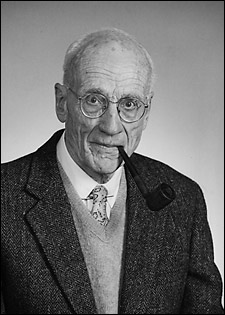Barrington Moore Jr., 92, Harvard sociologist
Memorial set for Nov. 1
Barrington Moore Jr., a Harvard University sociologist, died in his home in Cambridge, Mass., on Oct. 16, 2005, at the age of 92. The cause of death was pneumonia. 
Moore had a profound impact on a generation of scholars in the social sciences, many of whom were his students at Harvard where he taught from 1951 until 1979. As the editors of a Festschrift in his honor wrote: “There is a distinctive Moore-inspired approach to contemporary social science, even if there is no orthodox Moore School.” This approach included a commitment to tackling important questions, an aversion to models that ignored the historical situation in which social change takes place, and a commitment to interdisciplinary work that is comparative and historical.
Moore was a classics major at Williams College and received a Ph.D. in sociology at Yale University where he worked with Albert Galloway Keller. During World War II, he served as a strategic analyst in the OSS, along with Herbert Marcuse, H. Stuart Hughes, Franz Neumann, and many others. After the war, he taught in the interdisciplinary Social Science Division at the University of Chicago from 1945 to 1947. He then joined the Russian Research Center at Harvard University in 1947, where he remained an affiliate until his retirement.
Moore’s first books – “Soviet Politics: The Dilemma of Power” (1950) and “Terror and Progress: USSR” (1954) – concerned the Soviet Union, an interest that began because of his wartime research. In 1958, he published a collection of seven essays titled “Political Power and Social Theory” that reflected on the human condition in modern society.
In Moore’s most influential book, titled “Social Origins of Dictatorship and Democracy: Lord and Peasant in the Modern World” (1966), he traced the political and socioeconomic transformation of six countries that followed democratic, fascist, or communist routes to modernity. J.H. Plumb in his review for The New York Times wrote at the time, “This is a profoundly important book, as much for what it attempts as for what it achieves. … Throughout the book, there is a constant play of mind that is scholarly, original and imbued with the rarest gift of all, a deep sense of reality. … I expect that this book will influence a whole generation of young American historians and lead them to problems of the greatest significance.”
In summarizing the book’s impact, the editors of his Festschrift wrote “‘Social Origins’ … helped to inspire new agendas of research and reflection in macroscopic social science. Here was a book of epochal vision and rigorous comparative inquiry, a work that explored morally compelling questions about the societal underpinnings of freedom and oppression, probing the roots of democracy, revolutions, communism, and fascism in modern world history.”
Other important books followed: “Reflections on the Causes of Human Misery and Upon Certain Proposals to Eliminate Them” (1972), “Injustice: The Social Bases of Obedience and Revolt” (1978), “Privacy: Studies in Social and Cultural History” (1984), “Authority and Inequality under Capitalism and Socialism” (1987), “Moral Aspects of Economic Growth, and Other Essays” (1998), and “Moral Purity and Persecution in History” (2000).
Moore was an avid sailor and skier for most of his life and taught both after his retirement with the same great conviction and skill that he devoted to scholarly work and teaching.
His wife and collaborator, Betty Ito, died in 1992. He is survived by his brother Peter Van C. Moore of Bethesda, Md.
A memorial service is planned for Nov. 1 at 5 p.m. at the Minda de Gunzburg Center for European Studies, 27 Kirkland St., Cambridge, Mass.




